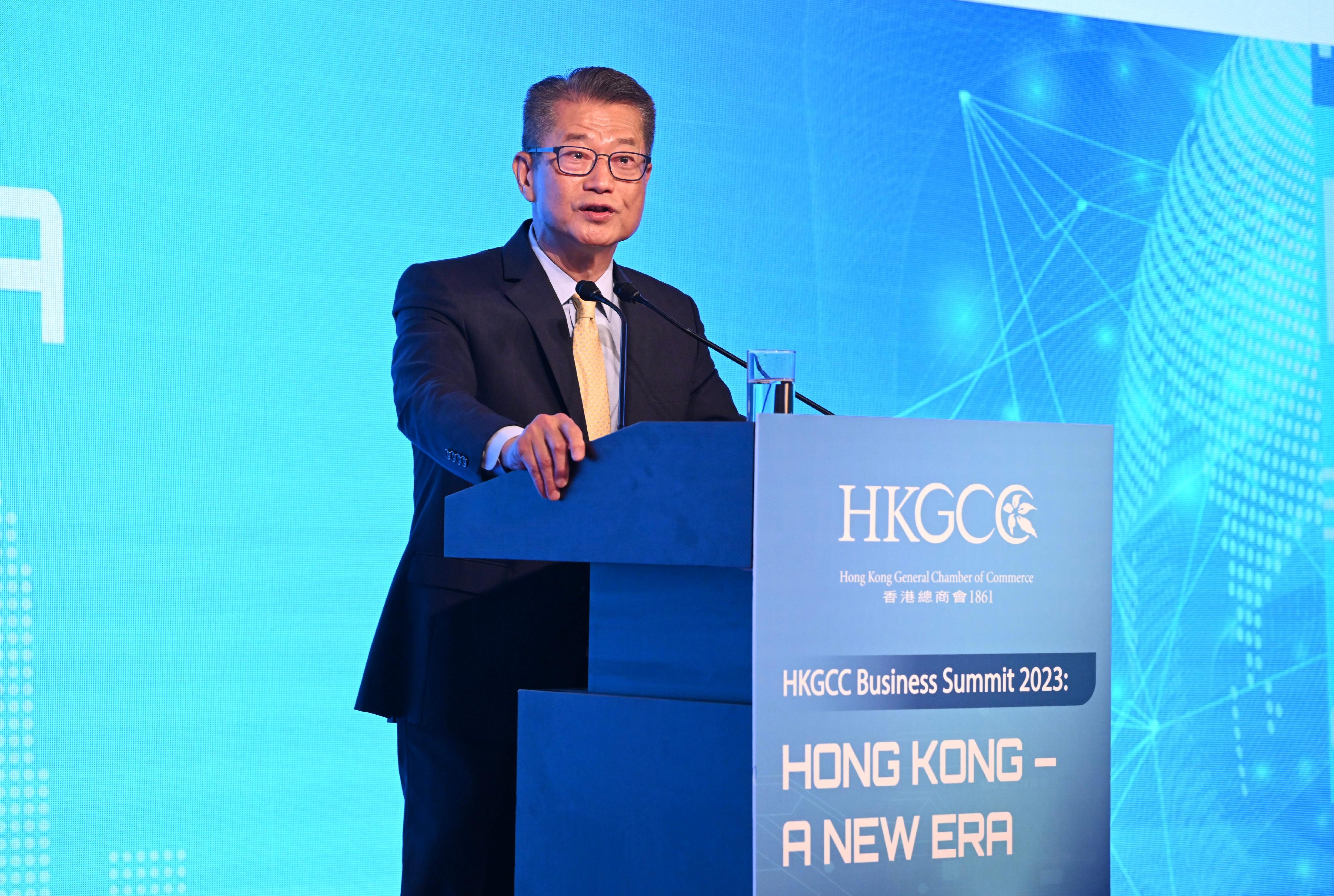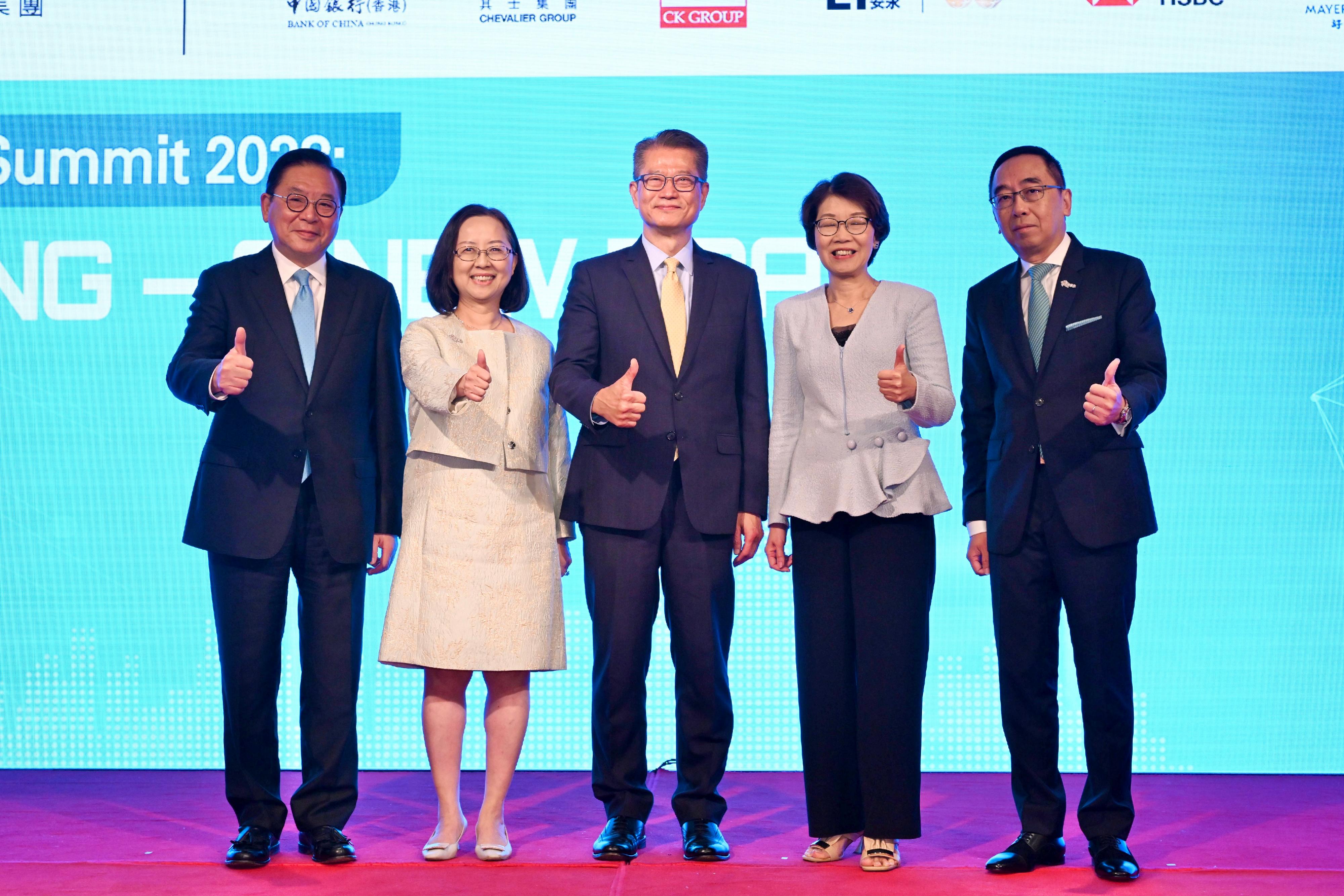Speech by FS at Hong Kong Business Summit 2023 (English only) (with photos)
***************************************************************************
Betty (Chairman of the HKGCC, Mrs Betty Yuen), Agnes (Deputy Chairman of HKGCC, Ms Agnes Chan), Jeffrey (Non-official Member of the Executive Council, Legislative Council Member Mr Jeffrey Lam), distinguished guests, government colleagues, ladies and gentlemen,
Good morning. I'm very pleased to join you today for the Hong Kong Business Summit, a flagship event of the Hong Kong General Chamber of Commerce.
This is, I think, the first time in three years that this event is held again physically. Indeed, we are in a new era, an era for us to focus our attention and energy on economic development, on bringing Hong Kong to another level, both economically and as a community.
I understand that there is a very strong line-up of speakers today, with my colleagues from the financial services sector, firstly focusing on Hong Kong's status as an international financial centre, and then moving on to the drivers of the Hong Kong economy for future growth. Allow me to spend the next few minutes to give you an update of the global and Hong Kong's economic situation, as well as what we in this term of Government are doing, so as to give you some context to facilitate your discussion.
The global economic situation is challenging, more challenging than last year. The IMF (International Monetary Fund) released a forecast to further revise downward the global economic growth to 2.8 per cent from 3.4 per cent earlier. And geopolitical challenges are daunting, with the Russia-Ukraine conflict adding to the high inflation rate. It seems that high interest rate level will remain for quite some time, and this will dampen demand, add to business costs, and increase the risk of an economic downturn.
If you look at the US (United States), the first-quarter annualised growth was just 1.1 per cent. Compared to a growth in GDP (Gross Domestic Product) of 2.1 per cent in 2022, it is a very obvious slowdown. But the labour market is still very tight. In view of this situation, it's difficult for inflation to come down. Interest rates will stay high for quite some time.
If you look at Europe, it is even worse. For the first quarter, the growth was just 0.1 per cent. Last year, Europe's GDP growth was 3.5 per cent. High interest rates, tightening monetary policy and political conflicts will add substantial pressure on business.
But luckily, for our country, the Mainland, the first-quarter economic growth was about 4.5 per cent, which has exceeded market expectation. For the entire year 2023, the original forecast of GDP growth for the Mainland was 5 per cent. Now many economists are revising it, with some indicating that it may well exceed 6 per cent.
But the situation is not without challenges. In fact, if you look at the export figures of the Mainland, it is not very optimistic. It still registered a slight drop. Globally, given the weak demand and the geopolitical tensions, exports from the Mainland will face uphill challenges.
Fortunately, the Mainland has ample policy room for stimulating private consumption. Our fingers are crossed that the Mainland will be a key engine of economic growth in 2023; and the growth of developing Asia as a whole, will be much stronger than the US and Europe. The IMF's forecast is that developing Asia, including the Mainland, will grow by 5.3 per cent. It would be a very impressive increase compared to last year.
So what are the implications of all these - geopolitical tensions, high interest rates - to us in Hong Kong? And due to political tensions and ideological conflicts, we have heard a lot about "onshoring", "friendshoring", or even "nearshoring". So the economic world order is changing, from globalisation to fragmentation. This would present some tremendous challenges. That would also impact on our response. As an open, small economy, how do we respond?
In Hong Kong, at the turn of this year so far, the economic growth is better than last year. For the whole year, we have given a forecast of a GDP growth of 3.5 to 5.5 per cent. For the first quarter, the actual growth was 2.7 per cent. If you look at the components – with the pandemic under control, the removal of all the restrictions and social distancing, international travelling, tourists coming back - the export of services saw a very strong rebound, benefitting from international and Mainland tourists' arrivals. We also benefitted from better local consumption. Private consumption rebounded strongly in double digits.
However, export dropped by about 18.7 per cent in the first quarter. The figure for April hasn't been released yet, but it will continue to decline. And this is against the backdrop of an export decline of over 25 per cent in the last quarter in 2022. So, among the three drivers of economic growth, export will continue to drag our economy.
With the improved ambience, fixed capital investment rebounded in the first quarter by over 5 per cent. Last year, it recorded a decline of about 8 per cent. This is good news.
In the meantime, what we at the Government are trying to do is to continue to stimulate private consumption to support SMEs (small and medium-sized enterprises). We extended our guarantee scheme for the SMEs, so that they could still borrow from the banks with 100 per cent guarantee from the Government – if they want to continue to run their business, or if they think the challenges are temporary and they could overcome it, we would give them support. Thereby we will also secure employment, because SMEs account for over 98 per cent of the number of businesses in Hong Kong and employ over 45 per cent of the private sector workforce. By securing this sector and protecting employment, it will also lend support to consumption.
This year, we dished out another round of consumption vouchers. I had actually been criticised for this. Some said, "Are you prudent enough with public finance, given the deficit? Is this still wise to give out another round of consumption vouchers?" I beg to differ. I think at the moment, given the external challenges, and the drag on our economy by weak exports, we need to sustain consumption, and to instil confidence in people and the business sentiment.
And that brings me to another initiative in the Budget: that is "Happy Hong Kong". We have been through three and a half very difficult years. Economic growth is important to us, but it is important that the community also feels good and has a positive spirit and smiles. That's why we rolled out the "Happy Hong Kong" Campaign. And I appeal to you all: do participate, and bring more positive energy to the people around you, and the community.
That is short-term, immediate response to the challenges. What next? What will this term of Government do for the remainder of this term? We will focus on economic development, understanding all along that our success will very much depend on our ability to capitalise on the economic growth on the Mainland and gain the support of the country. So we need to look at the development strategies of the Mainland, align ourselves with them, and ride on the growth.
In the 20th National Congress of the Communist Party of China last October, and at the "two sessions" meeting in March this year, the key message on the economic aspect is pursuing high-quality development. That includes putting emphasis on achieving greater self-reliance and strength in science and technology, pursuing green transition, and supporting the healthy development of private enterprises. In fact, in the Budget this year, we have also set out three areas for high-quality development.
Of course, the 14th Five-Year Plan has given Hong Kong the status of an international financial centre, shipping and trading centre, etc. I trust you are familiar with them. In the new era, perhaps we should focus on one aspect: developing the digital economy. We are very much behind in this regard, and we need to catch up.
Second, to develop and capitalise on the opportunities of Web3.0. Web3.0 does not come without controversy. But if we put in a proper regulatory framework and the necessary guardrails to protect investors' interests as well as ensure financial stability, I think we could tap the huge emerging opportunities. And since we announced, by way of a policy statement issued last October, our stance to facilitate the development of a vibrant virtual assets sector and ecosystem; and in the Budget this February, our determination to develop Web3.0, we have seen overwhelming response. More people in the circles are coming.
And finally, green tech and green finance. We are strong in green finance. We have a strong cluster of greentech companies and startups, while we also have the advantage of collaborating with Shenzhen's tech sector. So by marrying greentech and green finance - we would be able to build a complete industry chain, which will be favoured and needed by the next generations.
In the interest of time, finally, what are the constraints facing us? Basically they relate to capacity: talent and labour as well as land supply. For talent, we are going to deal with it head-on. We rolled out the Top Talent Pass Scheme and upgraded the other talent admission schemes. So far the response has been overwhelming. Since last December, we have received over 60 000 applications for the new and upgraded schemes, and have approved more than half of them. People are coming. For labourers, it has started with importing workers for elderly nursing homes. Construction and other sectors would follow.
For land supply, we take an infrastructure-driven approach. On the one hand, we would release development potential in the New Territories, and on the other, spur development by transport-led strategies. We are doing our utmost to speed up the supply of land.
Thank you so much for giving me the opportunity to share with you what we in this Government are doing. I appreciate the opportunity. Thank you.
Ends/Wednesday, May 10, 2023
Issued at HKT 19:00
Issued at HKT 19:00
NNNN




